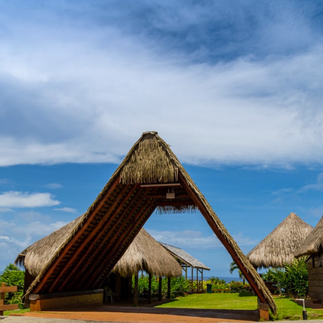Nieuwe Bohío: A Digital Retrospective on Indigenous Caribbean history, culture, and mythology.
- Twin Island Cinema
- Apr 7, 2024
- 4 min read
Niewue Bohío is a research and design project under the 2024 Tilting Axis Research Fellowship, that seeks to embark on an immersive journey into the Afro-indigenous cultures of the Caribbean region, with the ultimate objective of creating a cinematic and transformative virtual reality experience.
The Tilting Axis Fellowship is supported by the Nieuwe Instituut as lead partner and host, and will include collaborations with the Amsterdam Museum, De Appel, Stedelijk Museum Amsterdam and Kunstinstituut Melly.
The findings will serve as the foundation for an eclectic spectrum of practical applications including architectural research, sustainable community planning, and the development of an interactive Augmented Reality (AR) experience. By examining the traditional architectural techniques, use of materials, and spatial organization principles of our indigenous peoples, we can integrate their cultural elements into contemporary design practices and create physical and digital spaces that pay homage to our indigenous legacy while addressing urgent contemporary challenges like climate change and economic instability.
By exploring the rich historical legacy of the Afro-indigenous peoples, this fellowship aims to inspire innovative approaches to architectural design; foster safer, happier and more climate resilient communities; and provide an educational and entertainment platform for deeper cultural appreciation and identity for a new generation.
In the present day, The Caribbean, like many other regions, faces a myriad of challenges. Climate change poses significant threats, such as rising sea levels, increased frequency of extreme weather events, and changing ecological dynamics. Additionally, the islands grapple with economic crises and the need for sustainable development that respects the local heritage and nurtures community well-being. It is imperative to draw upon the wisdom and cultural heritage of the indigenous peoples to respond to these modern-day challenges effectively.

By understanding the spatial practices and architectural traditions of the Taíno and Kalinago people, we can gain insights into their sustainable approaches to living in harmony with nature and fostering community resilience. By incorporating their wisdom and principles into contemporary design and planning, we can reimagine individual and community spaces that embrace cultural diversity, promote social cohesion, and address pressing environmental concerns.
Objectives & Methodology
Through archival access, and study of archeological findings, this research fellowship seeks to document the indigenous knowledge and cultural practices of the Kalinago people of St. Kitts & Nevis and their Taíno, Ciboney and Arawak neighbours across the region. By examining their traditional architectural techniques, use of materials, and spatial organization principles, we can rediscover their heritage and revive their wisdom. By integrating their cultural elements into contemporary design practices, we can create physical and digital spaces that pay homage to our indigenous legacy while addressing the urgent challenges of climate change and economic crises.
The research will be conducted in three modules, with activities and primary objectives of exploring spatial heritage for contemporary design, re-imagining indigenous mythology and ultimately reconnecting heritage via virtual reality.
Jury comments on the selected proposal
St. Kitts and Nevis-based Klieon John will use the Fellowship as a birthing space to develop his research integrating archeological findings, architectural research, sustainable community planning, non-western architecture and the development of an interactive 3D video game universe. Klieon’s examination of traditional architectural techniques, materials, and spatial organisation principles will form a foundation from which these cultural elements will be integrated into contemporary design practices, informing the proposed digital space honouring Indigenous legacies while responding to the urgent and current challenges of the climate emergency and economic crises. His research will explore the integration of gameplay elements with storytelling techniques to effectively convey mythical themes within the game format while encouraging active user engagement and an appreciation for indigenous cultural heritage.
The jury felt that Kileon’s interest in growing his understanding of virtual reality game design as a way to think about the region’s past and potential futures. His submission responds to the moment in compelling ways involving issues of interpretation, conservation, preservation and ethical considerations relating to understanding and working with Caribbean Indigenous narratives and knowledge systems. The jury was inspired by Klieon’s ambitious submission and his goal to create a transformative virtual reality experience informed by the indigenous Taíno and Kalinago cultures of St. Kitts & Nevis and the wider Caribbean. Furthermore, the jury recognised Klieon’s proposed methodology to consult with Indigenous communities and cultural experts to ensure respectful representation while maintaining ethical approaches to working with these communities in the region.
A Future for Nieuwe Bohío: Visit The VR Village
The completion of this research project will present a platform rich with potential applications for social and economic development in the Caribbean Region; rescuing the wisdom from the past.
The completed platform will allow users to:
Create new sustainable architectural concepts based on indigenous practices;
Visit a Taíno Village using VR Headsets;
Participate in an Areyto ceremony;
Play a game of Batu wit your friends around the world;
Have virtual dinner with your own tribe;
Licence the virtual space to creators for education, art installation, film, video game settings etc;
Foster a deeper cultural appreciation and associations with modern indigenous peoples in the region.
This research fellowship seeks to blend cutting-edge technology with the invaluable cultural heritage of the Afro-indigenous people to create a transformative virtual reality experience. This immersive platform will serve as the bedrock for new architectural research, innovative community planning, and the development of an educational and entertaining interactive 3D space that inspires present and future generations. By integrating their cultural elements into contemporary design practices, we can create a lasting impact on cultural preservation, sustainable development, and inclusive community spaces in St. Kitts & Nevis and other regions facing the urgent challenges of climate change and economic crises.





















Comments